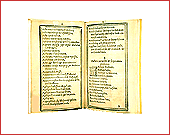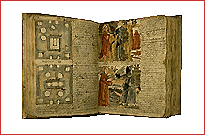 Printing allows the written word to be widely available. Because it is a
means of disseminating revolutionary ideas or of attacking established power, there have
been attempts on part of secular and religious institutions to contain or suppress the
written word. Printing allows the written word to be widely available. Because it is a
means of disseminating revolutionary ideas or of attacking established power, there have
been attempts on part of secular and religious institutions to contain or suppress the
written word. The Catholic Church began banning heretical writings long
before the introduction of printing, and as early as the council of Nicea in 325.
Abelard's works were banned in 1121, the Hebrew Talmud was banned from 1239 to
1329, and in 1520 all the works of Martin Luther, both extant and forthcoming, were also
prohibited. Governmental leaders also undertook to ban books, including Henry VIII of
England, Charles V, Emperor of the Holy Roman Empire, and the Spanish Inquisition, where
Church and state collaborated. The Catholic Church began banning heretical writings long
before the introduction of printing, and as early as the council of Nicea in 325.
Abelard's works were banned in 1121, the Hebrew Talmud was banned from 1239 to
1329, and in 1520 all the works of Martin Luther, both extant and forthcoming, were also
prohibited. Governmental leaders also undertook to ban books, including Henry VIII of
England, Charles V, Emperor of the Holy Roman Empire, and the Spanish Inquisition, where
Church and state collaborated. |
